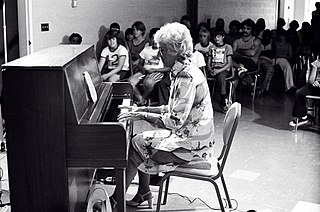A Quote by C. S. Lewis
The Moral Law tells us the tune we have to play: our instincts are merely the keys.
Related Quotes
Strictly speaking, there are no such things as good and bad impulses. Think...of a piano. It has not got two kinds of notes on it, the 'right' notes and the 'wrong' ones. Every single note is right at one time and wrong at another. The Moral Law is not any one instinct or set of instincts: it is something which makes a kind of tune (the tune we call goodness or right conduct) by directing the instincts.
The realization of our soul has its moral and its spiritual side. The moral side represents training of unselfishness, control of desire; the spiritual side represents sympathy and love. They should be taken together and never separated. The cultivation of the merely moral side of our nature leads us to the dark region of narrowness and hardness of heart, to the intolerant arrogance of goodness; and the cultivation of the merely spiritual side of our nature leads us to a still darker region of revelry in intemperance of imagination.
When you say there's too much evil in this world you assume there's good. When you assume there's good, you assume there's such a thing as a moral law on the basis of which to differentiate between good and evil. But if you assume a moral law, you must posit a moral Law Giver, but that's Who you're trying to disprove and not prove. Because if there's no moral Law Giver, there's no moral law. If there's no moral law, there's no good. If there's no good, there's no evil. What is your question?
Satan will always work on the Saints of God to undermine their faith in priesthood keys. One way he does it is to point out the humanity of those who hold them. He can in that way weaken our testimony and so cut us loose from the line of keys by which the Lord ties us to Him and can take us and our families home to Him and to our Heavenly Father.
None of us like the concept of law because none of us like the restraints it puts on us. But when we understand that God has given us his law to aid us in guarding our souls, we see that the law is for our fulfillment, not for our limitation. The law reminds us that some things, some experiences, some relationships are sacred. When everything has been profaned, it is not just my freedom that has been lost- the loss is everyone's. God gave us the law to remind us of the sacredness of life, and our created legal systems only serve to remind us of the profane judgments we make.
There is no author or legislator of the moral law. It is simply valid in itself in the nature or essence of things. We become autonomous only when we obey it, because then our will aligns itself with the objectively valid law, and our choice follows the same law as that we give ourselves. We can think of rational faculty (or the idea - the pure rational concept, not exhibitable in experience) as the legislator or author of the law because reason recognizes an objective standard, and to that extent is already aligned with objective moral truth.


































